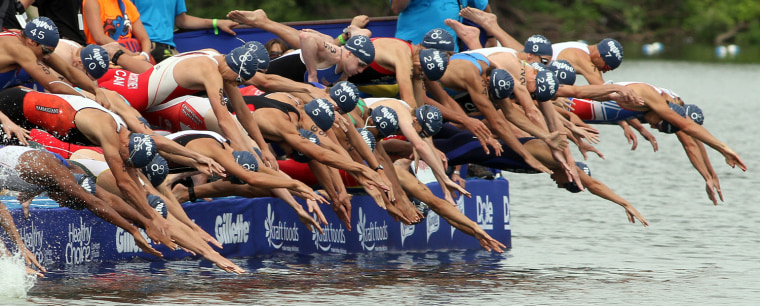Jenna Parker is a 25-year-old professional triathlete who estimates that she's competed in 100 triathlons since 2003. She swam competitively in college for three years at Harvard University.
And yet, even she admits that the swimming portion of the intense, three-part race can be scary enough to send a pro into panic mode.
"The swims are actually ridiculously vicious," Parker says. "There have been times when I’ve been dunked under, I’m literally seeing people swimming above me, then I get dunked under again -- it really can be terrifying."
The scariness of the swimming leg of the increasingly popular race is top of mind for many aspiring triathletes, after this past weekend's Ironman U.S. Championship in New York City and New Jersey, where a 43-year-old man died after experiencing a medical problem during the 2.4-mile swim in the Hudson River. (The cause of death has not yet been determined.)
Hudson River swimmer dies during Ironman race
Last summer, after five triathlete deaths including two at the Nautica New York City Triathlon, USA Triathlon, the governing body for the sport, created a task force to examine those fatalities. (So far, they've completed a preliminary report, but nothing yet for public eyes.)
A 2010 study published in the Journal of the American Medical Association aimed to identify the causes of sudden deaths during a triathlon in participants who competed in USA Triathlon-sanctioned events from January 2006 to September 2008. There were 14 deaths during the study period -- 13 of those triathletes died while swimming. The study also found triathlons to be more dangerous than that other extreme sport that's gone mainstream: marathons. There were 1.5 deaths for every 100,000 triathlons participants, compared to 0.8 deaths for every 100,000 marathon runners.
Triathlons have exploded in popularity in recent years. According to one estimate by fitness research group Sporting Goods Manufacturers Association, 2.3 million people participated in at least one triathlon in 2010 -- that's up from about 1.5 million in 2009. That means more first-timers are entering the race, often with varying levels of fitness and preparedness.
We rounded up expert tips for beginner triathletes to keep themselves safe -- and calm -- in the open water swim.
Before you start any training program, see your doctor. This may seem a little "no-duh," but it's especially important if you're coming off a period of being very sedentary, says Joe Baker, a sports scientist at York University in Toronto and co-author of "Triathlon," a practical guide for triathletes to improve their mental performance in competition.
Do a practice swim in open water. Most recreational athletes do the bulk of their training for the swim portion of the race in a pool, which has walls you can hang onto if you need to catch your breath, and a handy line running down the bottom of the lane to keep yourself swimming straight. That's why "that mosh pit of a start" in the open water swim can be such a shock, Baker advises.
Grab a buddy (or, even better, a group of buddies), don a wetsuit if it's necessary and practice doing a mass start. "Have all your friends line up so you get used to people next to you -- and arms flailing about, and white water everywhere -- so you can start to get used to that and so you can learn how not to panic," Parker suggests. It'll be good practice to help you remember that if you get kicked or hit by another swimmer, they're not doing it on purpose. You should also practice "sighting," which will help you swim straight: every six or eight strokes, for example, pick your head up and look forward.
Pay attention to the pre-race instructions. Before the start of a triathlon, an announcer will let you know the safety precautions the race has in place -- a kayak or boat may come to your rescue, for example -- but many first-timers are so nervous and excited about the race that all they hear is "blah blah blah." Take a few deep breaths, and listen, urges Baker.
Hold back at the start of the race. Be honest with yourself about your own abilities: Are you in it to win it -- or just to complete the thing? When it's time for your wave to head into the water, it might be a good idea to count to 10 -- and then follow the pack on in. "Wait until everyone else gets in the water and then get in," Baker advises. "Triathlons are a long event; you can easily make that time up."
Relax. Have a phrase or mantra ready to go for when you feel your nerves start to get the best of you. "Just saying the words, 'relax, relax,' almost as a way to hypnotize yourself," Baker says. "You will find you start to relax more, rather than focusing on the negative." Try counting your strokes, or your breaths, like Parker still does to calm herself in a race.
"(Approach) the race calmly and understanding that there will be some jostling and waves, but that this is only temporary, and soon there will be smooth waters," adds Camille Johnson, a social psychologist at San Jose State University who has competed in several triathlons. "They just need to ride out the storm of the first two minutes."
More from TODAY Health:
